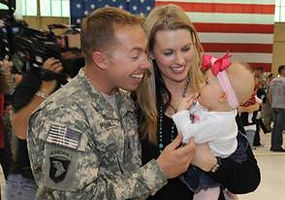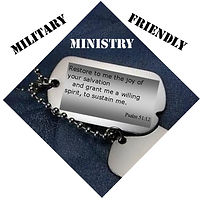Minister Resources
These resources are here to help ministers who reach out to military veterans, and those who have veterans in their congregation.
Be a military-friendly minister.
That doesn't mean that you have to advocate war or support the U.S. foreign policy. It does mean that you are willing to view military members and veterans as you would any other people with unique challenges.
Military members volunteered for a very difficult area of service, and their families sacrifice along with them.
During His earthly ministry, Jesus Christ ministered to soldiers. His church has the opportunity to do the same thing today!



The Readjustment Process
Returning combat veterans struggle with significant mental health issues upon returning home. Department of Defense medical authorities state that many returning Reserve and Guard members can begin to struggle four to six months after returning from combat.
According to the Department of Defense, 203,400 military personnel, including reserve and National Guard members, were currently on deployment in Iraq or Afghanistan as of June 30, 2011.
Almost half of all military personnel are parents. Almost two million children have a military parent. There is an incredible number of families who are experiencing or have experienced the strain of wartime military service and deployments.
Military deployments, characterized by lengthy and multiple separations, put terrible stress on family functioning, structure, and cohesion.
The effects of these deployments can also affect individual and social functioning.
We have a large number of returning veterans. They and their families now must reintegrate their lives after profound change has been experienced by each person over extended time.
Understanding the stage of deployment known as reintegration, or postdeployment, is extremely important.
The Veteran
The veteran is returning from a warrior lifestyle, where he or she bonded with a few other military members and maybe with some military families. The veteran was guided and provided for by the military. The veteran was "safe" within the confines of the military installation and the unit he or she was part of.
In civilian life, the veteran now has to live a very different life. There is no more sense of "safe" for the veteran. Now the veteran is required and expected to interact with multiple networks of people in order to survive: family, friends, co-workers, relatives, etc.
Now the veteran will often feel vulnerable, and will experience a sense of alienation because of the unique military experiences and the inability to adequately express them to people who haven't been there.
The veteran may feel that friends and co-workers have "moved ahead" while he or she was "stuck in time." Or vice-versa.
Their old friends and relatives have gone to school, married, been promoted, learned new skills, and advanced in their careers. Or the veteran might feel that their old friends and relatives haven't done much growing, while they themselves were "forced" to grow quickly.
Either way, the veteran is faced with trying to "fit in" in a world where the veteran often feels out of place.
Ministry to Veterans
All of this creates the opportunity for the church to labor in a very unique ministry... helping veterans and their families.
The opportunity to minister comes through understanding:
Gain understanding of what military members and their families faces when they reunite. They have all been pushed to the limits of their endurance. They have been stretched, challenged, and overwhelmed.
Here is what any military-friendly church that wants to help veterans and their families can do:
-
Participate in the Readjustment Process
-
Help the Veteran "Fit In"
Resources:
Department of Defense:
Military Ministry:
Help for Military Veterans:
-
Addiction
-
Children, Youth and Teens - Products
-
Deployment After a Recent Move
-
Post-Traumatic Stress Disorder (PTSD)
-
Returning to a Single Life
-
Reintegration
-
Sexual Assault
-
Single Parenting while Your Spouse is Deployed
-
Suicide Prevention